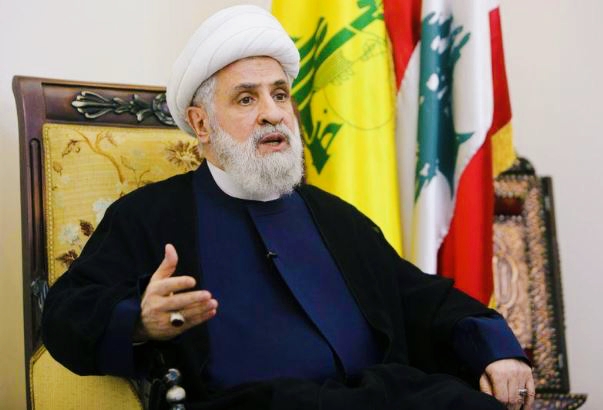In a notable step with political and judicial dimensions, a number of Lebanese MPs and prominent figures today filed a direct criminal complaint against the Deputy Secretary-General of "Hezbollah", Sheikh Naim Qassem, following statements deemed "inciting" and "threatening to civil peace" and "contradicting the decisions of the constitutional authority".
MPs Elias Khoury, Ashraf Rifi, Camille Chamoun, George Okais, along with former MP Eddie Abi Lamaa, and the head of the "Change" movement, lawyer Eli Mahfoud, went to the Palace of Justice in Beirut, where they submitted the complaint to the public prosecutor, Judge Jamal Al-Hajjar, and it was registered in the office of the public prosecutor.
* Content of the Complaint
The signatories of the complaint took on the role of personal prosecution against Naim Qassem, in addition to anyone the investigation reveals as an active participant, accomplice, intervenor, or inciter, following statements made by Qassem recently, in which he warned of a "sedition that could lead to a widespread civil war" if the weapons of "Hezbollah" were removed, considering that the Lebanese government is implementing an "American-Israeli" agenda aimed at eliminating what he described as "the resistance".
* Statements from the Palace of Justice
MP George Okais delivered a speech on behalf of the complainants, stating:
"Resorting to the judiciary is the way to protect the decisions of the Lebanese government. We trust that justice will take its course, and that the judiciary will remain the guarantor of public freedoms and civil peace".
As for MP Ashraf Rifi, he emphasized that:
"The Iranian role in the region has ended. The response to Qassem's statements came through a constitutional plan that affirms that the state unites, while the statelet divides".
For his part, lawyer Eli Mahfoud clarified that what was submitted:
"Is not just a notification, but a direct complaint as personal prosecutors against Naim Qassem, because his statements pose a direct threat to the unity of the country and its constitutional authority".
* Political Background
The judicial escalation came after the significant controversy raised by Qassem's statements, in which he linked any attempt to disarm "Hezbollah" to the outbreak of a civil war, considering that the government is implementing an "American-Israeli project".
This comes at a time when the Lebanese government, headed by Nawaf Salam, announced the tasking of the Lebanese army with restricting weapons to the state only, which provoked strong objections from "Hezbollah".
* Prime Minister Nawaf Salam also responded via the "X" platform, saying:
"The talk that the government is implementing an American-Israeli project is unfounded. Our decisions are purely Lebanese made in the Cabinet, and no one imposes them on us".
He added:
"The Taif Agreement is our national charter, and it clearly states the extension of the Lebanese state's authority over all its territory with its own forces".
* General Context
The judicial move comes amid escalating political and security tensions in Lebanon, alongside increasing international pressure on the government to adhere to the Taif Agreement and implement Resolution 1701, which calls for the disarmament of armed groups outside the framework of the state.
While the government considers restricting weapons to the state a step towards stabilizing security, "Hezbollah" sees it as a threat to its resistance and a prelude to internal conflict.
This development opens the door to an unprecedented legal confrontation between MPs in the Lebanese parliament and "Hezbollah", at a time when attention is focused on the judiciary's position and its ability to handle this sensitive file amid the complex sectarian and political balances in the country.

